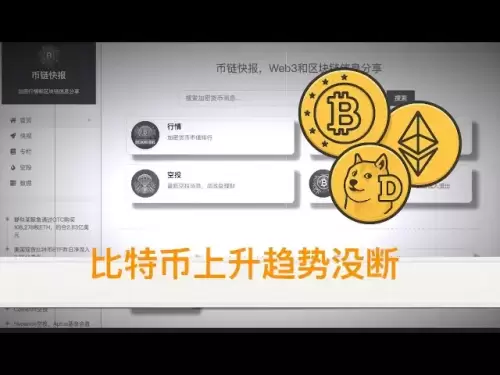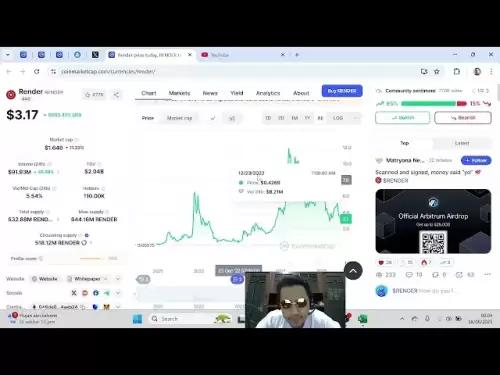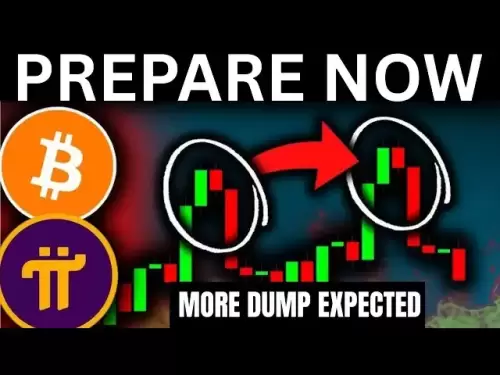-
 Bitcoin
Bitcoin $106,754.6083
1.33% -
 Ethereum
Ethereum $2,625.8249
3.80% -
 Tether USDt
Tether USDt $1.0001
-0.03% -
 XRP
XRP $2.1891
1.67% -
 BNB
BNB $654.5220
0.66% -
 Solana
Solana $156.9428
7.28% -
 USDC
USDC $0.9998
0.00% -
 Dogecoin
Dogecoin $0.1780
1.14% -
 TRON
TRON $0.2706
-0.16% -
 Cardano
Cardano $0.6470
2.77% -
 Hyperliquid
Hyperliquid $44.6467
10.24% -
 Sui
Sui $3.1128
3.86% -
 Bitcoin Cash
Bitcoin Cash $455.7646
3.00% -
 Chainlink
Chainlink $13.6858
4.08% -
 UNUS SED LEO
UNUS SED LEO $9.2682
0.21% -
 Avalanche
Avalanche $19.7433
3.79% -
 Stellar
Stellar $0.2616
1.64% -
 Toncoin
Toncoin $3.0222
2.19% -
 Shiba Inu
Shiba Inu $0.0...01220
1.49% -
 Hedera
Hedera $0.1580
2.75% -
 Litecoin
Litecoin $87.4964
2.29% -
 Polkadot
Polkadot $3.8958
3.05% -
 Ethena USDe
Ethena USDe $1.0000
-0.04% -
 Monero
Monero $317.2263
0.26% -
 Bitget Token
Bitget Token $4.5985
1.68% -
 Dai
Dai $0.9999
0.00% -
 Pepe
Pepe $0.0...01140
2.44% -
 Uniswap
Uniswap $7.6065
5.29% -
 Pi
Pi $0.6042
-2.00% -
 Aave
Aave $289.6343
6.02%
How to set transaction fees in Exodus?
Exodus suggests transaction fees, adjustable by users based on network congestion and desired speed; higher fees mean faster confirmations, especially crucial for Ethereum's gas fees.
Mar 12, 2025 at 06:40 am
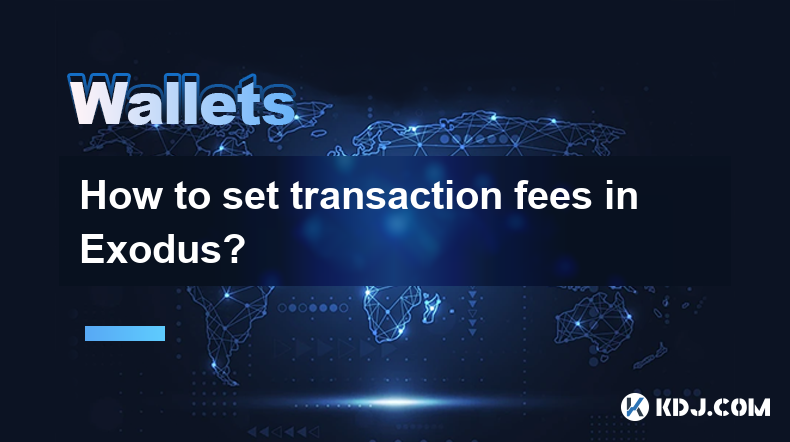
Key Points:
- Exodus automatically suggests a transaction fee, but users can adjust this manually.
- Fee adjustments depend on the network congestion and desired transaction speed.
- Higher fees generally result in faster transaction confirmations.
- Understanding gas fees (for Ethereum and ERC-20 tokens) is crucial for fee management.
- Exodus provides clear fee information before transaction confirmation.
How to Set Transaction Fees in Exodus
Exodus simplifies cryptocurrency transactions, but understanding how transaction fees work is vital for efficient and cost-effective transfers. While Exodus provides default fee suggestions, users can customize these based on their needs. The process slightly varies depending on the cryptocurrency involved.
For most cryptocurrencies, the process is straightforward. When initiating a transaction, Exodus will display a suggested fee. This fee is dynamically calculated based on network conditions, aiming for a reasonable balance between speed and cost. You'll typically see this fee presented as a specific amount of the cryptocurrency you are sending.
To adjust the fee, look for an option to modify the "fee" or "network fee" field. This option isn't always explicitly labeled as "fee," sometimes it's presented as "gas fee" or "miner fee," depending on the network and the cryptocurrency. The availability of manual fee adjustment depends on the specific coin. Some coins may only allow you to choose between "Low," "Medium," and "High" fee options. Others offer a custom field for manual input.
Remember, a higher fee generally leads to faster transaction processing. If network congestion is high, a higher fee increases your chances of quicker confirmation. Conversely, a lower fee may result in longer wait times, potentially delaying your transaction.
Understanding Gas Fees (Ethereum and ERC-20 Tokens)
For Ethereum and ERC-20 tokens, the fee structure is more complex. Instead of a simple fee, you encounter "gas fees." Gas represents the computational resources required to execute a transaction on the Ethereum network. The gas limit specifies the maximum amount of gas you're willing to spend, and the gas price determines the cost per unit of gas.
- Gas Limit: This is an estimate of the computational resources needed for your transaction. Exodus usually provides an automatically calculated gas limit, but it's always a good idea to review it, especially for complex transactions.
- Gas Price: This is the amount you're willing to pay per unit of gas. A higher gas price generally leads to faster transaction confirmation.
Exodus typically calculates both the gas limit and the gas price, presenting you with a total gas fee. Similar to other cryptocurrencies, you might have the option to adjust the gas price, influencing the overall fee and speed of the transaction. If you are unsure about the optimal gas price, checking various block explorers or gas fee trackers can offer insights into current network conditions.
Step-by-Step Guide (Illustrative Example)
Let's assume you're sending Bitcoin. The process would generally follow these steps:
- Open the Exodus wallet and select the Bitcoin wallet.
- Click "Send" to initiate a transaction.
- Enter the recipient's address and the amount of Bitcoin to send.
- Review the suggested transaction fee.
- If you wish to change the fee, locate the "Fee" or "Network Fee" option and adjust it. Remember to check if the fee adjustment is in Bitcoin or in sats (satoshis).
- Review all transaction details and confirm the transaction.
Common Questions and Answers
Q: What happens if I set the transaction fee too low?
A: Your transaction might take a considerably longer time to confirm, or it might even fail to confirm at all, especially during periods of high network congestion. Your transaction could remain pending indefinitely.
Q: Can I set the transaction fee to zero?
A: No, most networks require a transaction fee to incentivize miners or validators to process your transaction. Setting the fee to zero will prevent your transaction from being processed.
Q: How does Exodus determine the suggested transaction fee?
A: Exodus uses algorithms that take into account the current network congestion and historical transaction data to suggest a fee that aims for a balance between speed and cost.
Q: What if I'm unsure about the appropriate fee to set?
A: Start with the default suggested fee. If speed is critical, consider increasing it slightly. If cost is a primary concern, you can try reducing it, but be prepared for a potential delay in confirmation.
Q: Does the transaction fee vary depending on the cryptocurrency?
A: Yes, absolutely. Transaction fees are highly dependent on the specific cryptocurrency's network and its current congestion level. Some networks are inherently more expensive than others.
Q: Can I change the fee after I've initiated the transaction?
A: No. Once you've confirmed the transaction with the chosen fee, you cannot change it. The fee is finalized as part of the transaction broadcast to the network.
Q: Are there any external tools that can help me estimate fees before using Exodus?
A: Yes, many blockchain explorers and websites offer real-time estimates of transaction fees for various cryptocurrencies. These can provide additional context before setting your fee in Exodus. Using these tools can help you make a more informed decision.
Disclaimer:info@kdj.com
The information provided is not trading advice. kdj.com does not assume any responsibility for any investments made based on the information provided in this article. Cryptocurrencies are highly volatile and it is highly recommended that you invest with caution after thorough research!
If you believe that the content used on this website infringes your copyright, please contact us immediately (info@kdj.com) and we will delete it promptly.
- 2025-W Uncirculated American Gold Eagle and Dr. Vera Rubin Quarter Mark New Products
- 2025-06-13 06:25:13
- Ruvi AI (RVU) Leverages Blockchain and Artificial Intelligence to Disrupt Marketing, Entertainment, and Finance
- 2025-06-13 07:05:12
- H100 Group AB Raises 101 Million SEK (Approximately $10.6 Million) to Bolster Bitcoin Reserves
- 2025-06-13 06:25:13
- Galaxy Digital CEO Mike Novogratz Says Bitcoin Will Replace Gold and Go to $1,000,000
- 2025-06-13 06:45:13
- Trust Wallet Token (TWT) Price Drops 5.7% as RWA Integration Plans Ignite Excitement
- 2025-06-13 06:45:13
- Ethereum (ETH) Is in the Second Phase of a Three-Stage Market Cycle
- 2025-06-13 07:25:13
Related knowledge
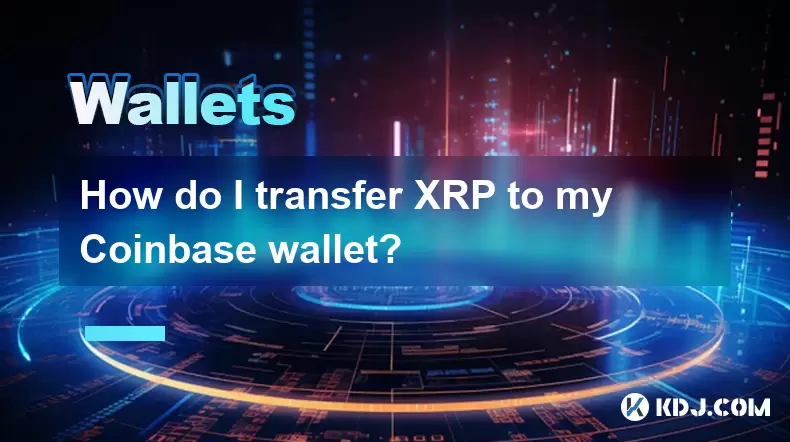
How do I transfer XRP to my Coinbase wallet?
Jun 16,2025 at 04:57pm
Understanding the Basics of XRP and Coinbase CompatibilityBefore initiating any transfer, it’s essential to confirm whether Coinbase supports XRP. As of recent updates, Coinbase has resumed offering XRP trading services on its platform after a period of uncertainty due to legal issues involving Ripple Labs. However, availability may vary depending on yo...

How do I deposit BNB into my Trust Wallet?
Jun 15,2025 at 03:56pm
Understanding BNB and Trust Wallet CompatibilityBefore initiating a deposit, it’s crucial to understand what BNB is and how it interacts with Trust Wallet. BNB (Binance Coin) is a utility token created by the Binance exchange. It can be used for paying transaction fees, participating in token sales, and more. Trust Wallet, on the other hand, is a mobile...
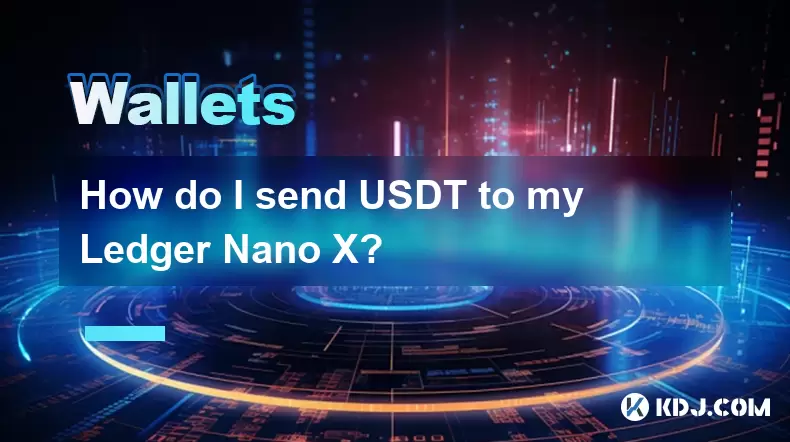
How do I send USDT to my Ledger Nano X?
Jun 15,2025 at 06:28am
What is USDT and Why Use Ledger Nano X?USDT, also known as Tether, is one of the most widely used stablecoins in the cryptocurrency ecosystem. It operates on various blockchain networks such as Ethereum (ERC-20), Tron (TRC-20), and others, offering users a digital asset pegged 1:1 to the US dollar. When it comes to storing USDT securely, hardware wallet...
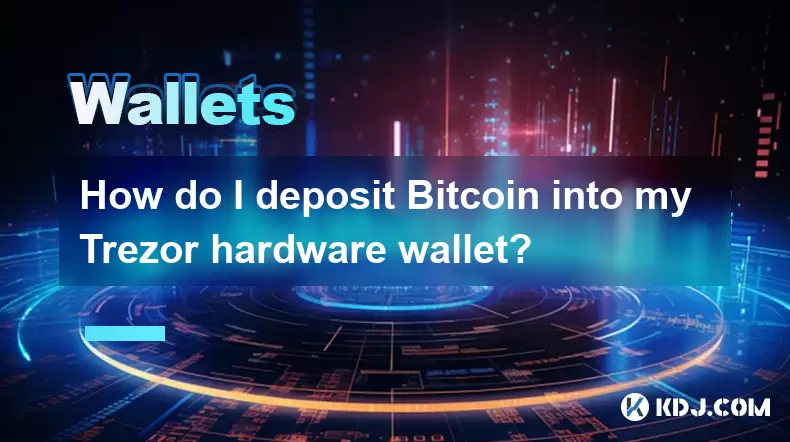
How do I deposit Bitcoin into my Trezor hardware wallet?
Jun 14,2025 at 12:29pm
What is a Trezor Hardware Wallet?A Trezor hardware wallet is a secure device designed to store cryptocurrencies offline, protecting them from online threats. Unlike software wallets, which are vulnerable to hacking and malware, Trezor stores private keys on the physical device itself. This ensures that transactions can only be approved by physically int...
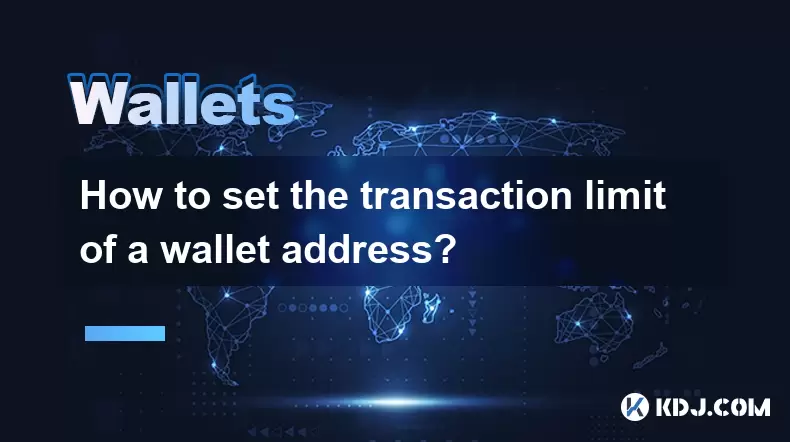
How to set the transaction limit of a wallet address?
Jun 16,2025 at 04:08am
Understanding the Concept of Transaction Limits in Cryptocurrency WalletsIn the cryptocurrency ecosystem, transaction limits refer to predefined restrictions placed on the amount of digital assets that can be sent or received by a wallet address within a specified timeframe. These limits are typically enforced by platforms such as exchanges, custodial w...
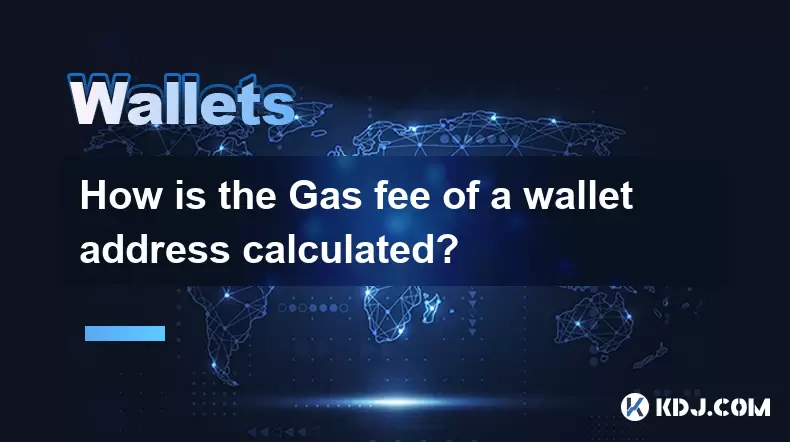
How is the Gas fee of a wallet address calculated?
Jun 14,2025 at 07:57pm
Understanding the Basics of Gas Fees in Blockchain TransactionsIn the cryptocurrency ecosystem, particularly within Ethereum-based networks, a Gas fee is an essential component of executing transactions or smart contract operations. The Gas fee serves as compensation for miners or validators who process and confirm transactions on the blockchain. It is ...

How do I transfer XRP to my Coinbase wallet?
Jun 16,2025 at 04:57pm
Understanding the Basics of XRP and Coinbase CompatibilityBefore initiating any transfer, it’s essential to confirm whether Coinbase supports XRP. As of recent updates, Coinbase has resumed offering XRP trading services on its platform after a period of uncertainty due to legal issues involving Ripple Labs. However, availability may vary depending on yo...

How do I deposit BNB into my Trust Wallet?
Jun 15,2025 at 03:56pm
Understanding BNB and Trust Wallet CompatibilityBefore initiating a deposit, it’s crucial to understand what BNB is and how it interacts with Trust Wallet. BNB (Binance Coin) is a utility token created by the Binance exchange. It can be used for paying transaction fees, participating in token sales, and more. Trust Wallet, on the other hand, is a mobile...

How do I send USDT to my Ledger Nano X?
Jun 15,2025 at 06:28am
What is USDT and Why Use Ledger Nano X?USDT, also known as Tether, is one of the most widely used stablecoins in the cryptocurrency ecosystem. It operates on various blockchain networks such as Ethereum (ERC-20), Tron (TRC-20), and others, offering users a digital asset pegged 1:1 to the US dollar. When it comes to storing USDT securely, hardware wallet...

How do I deposit Bitcoin into my Trezor hardware wallet?
Jun 14,2025 at 12:29pm
What is a Trezor Hardware Wallet?A Trezor hardware wallet is a secure device designed to store cryptocurrencies offline, protecting them from online threats. Unlike software wallets, which are vulnerable to hacking and malware, Trezor stores private keys on the physical device itself. This ensures that transactions can only be approved by physically int...

How to set the transaction limit of a wallet address?
Jun 16,2025 at 04:08am
Understanding the Concept of Transaction Limits in Cryptocurrency WalletsIn the cryptocurrency ecosystem, transaction limits refer to predefined restrictions placed on the amount of digital assets that can be sent or received by a wallet address within a specified timeframe. These limits are typically enforced by platforms such as exchanges, custodial w...

How is the Gas fee of a wallet address calculated?
Jun 14,2025 at 07:57pm
Understanding the Basics of Gas Fees in Blockchain TransactionsIn the cryptocurrency ecosystem, particularly within Ethereum-based networks, a Gas fee is an essential component of executing transactions or smart contract operations. The Gas fee serves as compensation for miners or validators who process and confirm transactions on the blockchain. It is ...
See all articles























